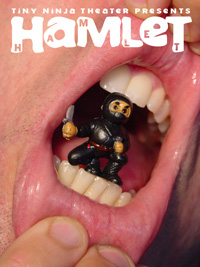12/31/05: Actual vs. Virtual Theatre
THOUGHTS ON ACTUAL VS. VIRTUAL THEATRE:
I've been trying to figure out what kind of theatre I want to do, and what kind of theatre experience I want to look for on this sabbatical. I come back to the idea of a "volatile" experience but I need to understand just what I mean by that word "volatile." Right now, I understand it to mean an experience which is unpredictable, in which anything might happen, and which is unrepeatable.
(I'm using the word "theatre" as opposed to "performance," because to me it takes the part of the spectator/audience. "Performance" is a word that seems to privilege the performer over the spectator.)
There's theatre that tells a story. Good theatre of this kind tells a very good story and tells it in a way which gives the audience the impression that they are having a genuine experience. Well, they are having a genuine experience (who am I to deny the validity of their experience?) but it is in the nature of a story to be repeated--that's what a story is. An expert enactment of a story can give me the impression that it is actually happening--it's that immersive. A very expert telling of a story can strip it down to the essentials so that I want to put myself into it, I imagine myself into it. I love a good story told well. But that's not exactly what I'm looking for. I'll call it "virtual theatre."
(One reason--the main reason--that I prefer "theatrical" theatre is that it goes farthest into fooling me that I'm having an actual experience, because it employes the actual reality of where we are and what the storytellers have to work with to tell the story. Sometimes it comes close to breaking through into actuality (Brook's Marat/Sade ending, even Wilder's Our Town). But I'm still basically listening to a story rather than participating in an event. And the more expert it is, the less volatile it is.)
I think (right now) that the only way to create actual as opposed to virtual theatre is to engage the audience in the action, to invite them to participate directly ("Sally's Rape," for all its faults, had its moments of actuality, and every night was a new experience). Of course, there's a history of such performances, much of it awful.
I tend to confuse the intensity of an experience with its actuality. Many "virtual" experiences are far more emotionally or even intellectually intense that the kind of "actual" experience I have in mind. But I think the actual experience has a greater chance of changing the participant--though I have no proof of that. But I think it's safe to say that many highly-charged emotional theatre experiences fade quickly (even if the memory stays).
So: Can an "actual" theatre experience be created around a story? Or does the presence of a text make it an unavoidably virtual experience? The question is important because I'm still looking for Shakespeare, but if I'm also looking for actual theatre, it may be impossible to find them both in the same place.


